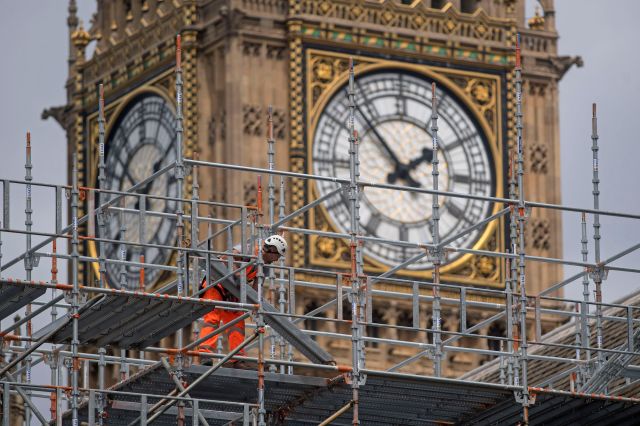Selling off the Westminster grounds is one way to offset the £61 million being spent to repair Big Ben. Credit: Victoria Jones/PA Wire

My walk into work used to take me past the Palace of Westminster. I’d have to bob-and-weave through crowds of tourists, but didn’t mind at all – anyone willing to pay to see my country is fine by me. One day, I walked past an America lady as she gazed up at the Mother of Parliaments: “Is that an old castle? It’s gotta be an old castle!”
As Peter Hitchens (another gothic masterpiece) explains in First Things, the Palace isn’t that old – not even by American standards:
“…the Houses of Parliament, all pinnacles, leaded windows, Gothic courtyards and cloisters… look to the uninitiated as if they are a medieval survival. In fact they were completed in 1860, and are newer than the Capitol in Washington, D.C.”
But despite its relative youth, the building is in a dreadful state. As Members of Parliament return after the party conference season, they know that they have a difficult decision to make regarding the renovation of their workplace. It’s not just the multi-billion pound cost, but the prospect of having to relocate for several years.
You might think that Hitchens would lament the evacuation of this great symbol of Britishness, but no:
“My nastier, more vindictive side rather hopes that it will take so long to renovate the British Houses of Parliament, and the unmistakable clock tower of Big Ben, that MPs have to move out of the building for good, and are rehoused in a hideous modern shed in the suburbs. This may seem spiteful. It is spiteful. Even so, there is a good case for it.”
Hitchens loves the building but believes that Parliament as an institution is no longer “distinguished enough to occupy it”:
“I had hoped for a kingdom of the mind and found a squalid pantry in which greasy, unprincipled deals were made by people who were no better than they ought to be.”
Jeremy Cliffe of the Economist isn’t exactly on the same ideological wavelength as Peter Hitchens, but he too wants Parliament to quit Westminster (and London) for good:
“Draw a circle with a 60-mile radius centred on Charing Cross. Within that circle the vast majority of public spending is administered… That circle contains all the major banks, most of the major theatres, the media and arts worlds, the five best universities (according to the Times Higher Education rankings for 2017), the hubs of all the country’s major industries, 70% of the FTSE 100, most of Britain’s airport capacity. The divide between Britain inside the circle and Britain outside it concentrates too much power within too few city districts, centred on too few restaurants, bars and social circles. It poisons the country’s politics.”
The poison isn’t just political:
“…it weakens the country’s economy. Economists agree that one of the major reasons for Britian’s dismally low productivity is that it has too few big cities: London sucks investment and talent away from regional hubs that might one day develop into conurbations of its size.”
Cliffe’s solution is to move the UK’s capital (and therefore its Parliament) to the North of England – specifically, Manchester.
Bold thinking, but symbols still matter. The Palace of Westminster is one of the world’s greatest buildings in the world’s greatest city. And it does not stand alone, but within walking distance of other remarkable buildings from which our history breathes: Westminster Abbey, Buckingham Palace, the Treasury, the Foreign and Commonwealth Office, and, of course, Number 10 Downing Street.
To close the door on all of that would symbolise decline, a collapse of faith in our institutions, a civilisation in flight from its former greatness.
And yet both Hitchens and Cliffe make powerful points. Our institutions are in need of renewal. The fight for our future prosperity will be won or lost in the cities of the North.
So here’s what we do: Scotland and Wales already have devolved governments with responsibility for health and education, local economic growth, housing and infrastructure. The UK could rebalance its lopsided constitution if England had the same – together with an English Parliament. Those could be situated in the North (not in Manchester, but York – England’s second capital and a small and beautiful city with room to grow into a great city, free from the planning mistakes of the post-war era).
That would allow a smaller, more focused, UK Government and Parliament to reform itself back in London. With many fewer MPs, Peers, Ministers and Civil Servants, we could finance the regeneration of Westminster by selling-off surplus parts of the sprawling Parliamentary Estate (which extends well beyond the Palace) and by dispensing with various undistinguished government buildings.
When you’ve got a bloated establishment sitting on some of the most valuable land on the planet, it’s an opportunity, not a problem.










Join the discussion
Join like minded readers that support our journalism by becoming a paid subscriber
To join the discussion in the comments, become a paid subscriber.
Join like minded readers that support our journalism, read unlimited articles and enjoy other subscriber-only benefits.
Subscribe